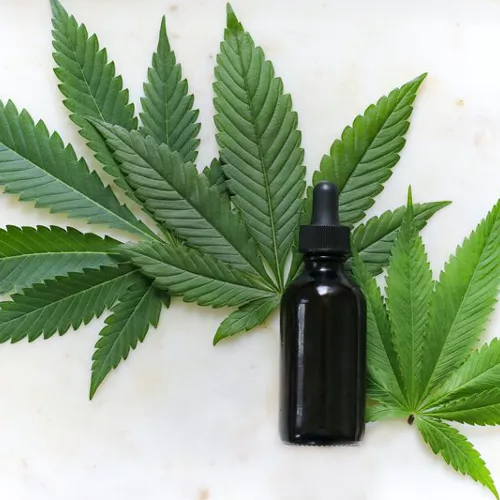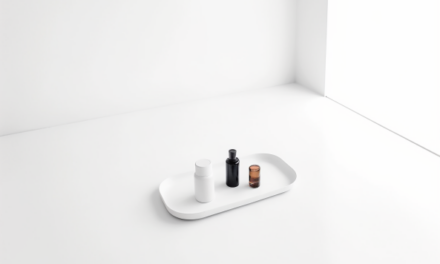CBD Skincare Benefits and Unknowns
Cannabidiol, or CBD, has attracted a lot of attention in the health and wellness sector, including the skincare industry. Interacting with our body’s natural signalling system, CBD can influence skin barrier, sebum production, skin microbiome, hair growth, pigmentation, and even skin aging. However, CBD in skincare is still largely unchartered territory. Let’s unpack the known benefits, the challenges, and the yet-to-be-explored potentials of CBD in skincare.

CBD: the new top skincare player?
CBD, short for cannabidiol, is a chemical compound found in the Cannabis sativa plant. Interestingly, our bodies also produce similar compounds called endocannabinoids, which are part of a complex system known as the Endocannabinoid System (ECS). The ECS plays roles in maintaining balance in many areas of our bodies, including our skin health.
Current research suggests that CBD, much like our body’s own endocannabinoids, can interact with the ECS present in our skin cells, influencing a range of skin functions. This includes skin barrier maintenance, sebum production, hair growth, pigmentation, and even fighting photodamage.
In fact, CBD has shown potential in treating skin conditions such as eczema, acne, rosacea, psoriasis, and more. But it’s important to note that the scientific understanding of CBD’s role in skincare is still in its early stages. We know CBD can interact with our skin cells, but the exact “language” of this communication isn’t fully understood yet. This makes the use of CBD in skincare somewhat of a gamble for now, as we can’t accurately predict all its effects.
In case you’d like to experiment with CBD in your skincare, keep in mind that not all products labeled as “CBD skincare” actually contain CBD. Real CBD appears on ingredient lists as “cannabidiol”. Ingredients like cannabis seed extract or hemp oil do not contain CBD.
The endocannabinoid system (ECS) and skin
You might be surprised to learn that our bodies naturally have a network called endocannabinoid system (ECS). This network helps maintain balance and health. It involves three key parts: endocannabinoids, which are signaling molecules our bodies produce; specific receptors that these molecules attach to; and enzymes that create or break down these endocannabinoids. The ECS plays roles in areas such as the brain, immune system, and skin health.
When it comes to skin health, recent research suggests that the ECS is very important. It helps keep our skin in balance, helping it to function properly. When the ECS is out of balance, it can lead to skin problems like acne, eczema, itching, hair loss, or uneven skin tone.
Now, let’s talk about endocannabinoids. They are signaling molecules that our body naturally produces. They were first discovered in the brain, but are also found in other parts of the body, including the skin. These molecules play a significant role in regulating skin functions.
These endocannabinoids connect with certain receptors, mostly known as CB1 and CB2. CB1 receptors are mainly found in the brain, while CB2 receptors are found elsewhere, like our skin and immune system. Both types of receptors are also found in our skin cells, playing different roles in skin health. In addition to CB1 and CB2, endocannabinoids also interact with other receptors in skin cells, which contribute to maintaining the skin barrier, cell growth, and immune response.
Now, endocannabinoids aren’t the only type of cannabinoids. Cannabinoids are classified into three types based on their origin. There are endocannabinoids, which we just talked about, and are produced by our own bodies. There are phytocannabinoids, which come from plants, especially the Cannabis sativa plant. The most well-known of these are CBD and THC. And finally, there are synthetic cannabinoids, which are made in a lab.
Cannabis plant and its cannabinoids
Cannabis plant is famous (and infamous) because it contains a specific type of chemical compounds called phytocannabinoids. There are over 100 different types of them.
These compounds are similar in their chemical structure and biological effect to endocannabinoids, the chemicals that human body produces naturally. These chemicals can bind to special receptors in our cells, “instructing” the cell to behave in a certain way. For example, to change its inflammatory response or grow slower or faster.
Not all parts of the hemp plant contain cannabinoids. For example, hemp seeds contain, if any, only a small amount of cannabinoids. This means that if you see a product with a cannabis seed extract in it, you should not expect any cannabinoid-related effects.
Among the many different types of cannabinoids found in cannabis, the two types, THC (tetrahydrocannabinol) and CBD (cannabidiol) are the most studied and used ones. THC has the ability to bind to receptors in our central nervous system. Because of this property, it can have a psychoactive effect on humans. In other words, THC can make people feel high. CBD, on the other hand, does not have a psychoactive action but still can impact many other processes in our body.
CBD’s journey into the skin
CBD’s potential to penetrate the skin is attributed to its relatively small size and affinity for fat. However, the journey into the skin is not easy.
CBD has characteristics that make it tricky to include in topical products. Firstly, it’s what scientists call ‘highly lipophilic,’ meaning it really does not like mixing with water. This causes a solubility issue – it doesn’t dissolve well and nice light-weigth formulations with CBD are hard to achieve. Also, if the goal is to deliver CBD deep into your skin, there’s another challenge. Given its highly lipophilic nature, CBD might end up accumulating in skin’s oil glands, forming deposits in the top skin layer (stratum corneum) and making it harder to penetrate deeper into the skin.
Despite these challenges, scientists have been working hard to create delivery systems and strategies that make CBD skincare products more effective. These strategies include the use of:
- Polysaccharides: These are complex carbohydrates that can help CBD dissolve better and enhance its delivery into the skin.
- Permeation enhancers: These are ingredients that can improve the ability of CBD to penetrate the skin barrier.
- Nanoparticles: Tiny particles can carry CBD and help it penetrate deeper into the skin.
- Nanometric emulsions: These are tiny droplets of CBD suspended in a liquid, which can increase CBD’s ability to mix with other ingredients and penetrate the skin.
- Cryogels: These are gel-like materials formed at cold temperatures, used to create a network that can deliver CBD more effectively into the skin.
Despite these scientific advancements, CBD skincare products can vary widely in their quality and effectiveness. Be especially critical of CBD skincare products from small brands that do not specialize in skincare or medicine and do not seem to be using any special formulation technologies for optimizing the CBD delivery.
Keep in mind that CBD is unstable. This means it can lose its effectiveness quickly on exposure to air and light.
So if you’re considering adding CBD skincare to your routine, it’s a good idea to do your research and check the manufacturer’s website carefully.
Potential skin benefits of CBD
Skin barrier function and CBD
Our skin acts as a protective shield, constantly fending off environmental aggressors. Damage from these factors can cause chronic inflammation and speed up skin aging. Research indicates that CBD may help to strengthen this shield by activating protective pathways in skin cells and preserving the health of the cell membrane, potentially assisting with inflammatory skin conditions like eczema or atopic dermatitis.
CBD for eczema
Eczema, also known as Atopic Dermatitis (AD), is a common skin condition that causes inflamed, itchy skin. CBD might help manage this inflammation, but again, more research is needed to confirm this. Interestingly, hemp essential oil, which does not contain significant levels of CBD, has shown promise in fighting off bacteria that can worsen eczema.
CBD for acne
Acne is a common skin issue that can be caused by too much oil (sebum) production, unwanted growth of skin cells (sebocytes), and inflammation. Interestingly, the ECS also plays a role in these processes. Some research indicates that CBD could help manage acne by affecting sebum production, sebocyte growth, and inflammation.
One study found that CBD could inhibit the excessive oil production caused by certain substances. It could also suppress the excessive growth of skin cells, but it didn’t reduce the number of healthy cells. CBD also exhibited anti-inflammatory effects, stopping certain compounds from causing inflammation.
CBD might also fight acne by combating the overgrowth of a bacterium called Cutibacterium acnes (C. acnes), which has been linked to acne. Though the current studies don’t provide a clear picture of CBD’s potential role in acne treatment, they open up exciting avenues for further research.
CBD and skin pigmentation
Our skin’s color is determined by the production of a dark pigment called melanin, which is regulated by a process called melanogenesis. This process is incredibly complex and involves more than 250 genes.
The ECS may play a role in melanogenesis, but this connection is not yet fully understood. Some studies have shown that certain endocannabinoids can either stimulate or inhibit melanogenesis through the CB1 receptor. For instance, a study found that CBD stimulated melanin production in human skin cells.
However, the interaction between ECS and pigmentation is still unclear, and more research is needed. Despite the potential of endocannabinoids as skin health mediators, it’s still too early to use them in treating pigmentation disorders.
CBD for psoriasis
Anecdotal evidence suggest that CBD can be helpful for treating psoriasis, a condition characterized by rapid skin cell growth and chronic inflammation.
Research has shown that CBD can interfere with a molecule called NF-kB, which plays a crucial role in inflammation and is particularly active in conditions like psoriasis. In lab tests on skin cells, CBD was found to reduce the activity of NF-kB.
However, it’s not all straightforward. While CBD has shown anti-inflammatory effects, its role in controlling skin cell growth and differentiation is unclear. Some studies suggest that CBD may inhibit excessive growth in certain skin cells, but others suggest it might actually promote growth of specific types of skin cells. This means more research is needed before we can definitively say CBD is beneficial for psoriasis treatment.
CBD and hair growth
Abnormalities in the hair growth cycle can lead to excess hair growth or alopecia. Early evidence suggests that CBD might interact with hair follicles in a beneficial way, although more clinical trials are required to confirm these findings.
CBD in topical skin products: what is known about its safety
CBD is becoming popular in skincare, popping up in everything from gels to lotions. But as its popularity grows, so do questions about its safety. Here’s a simple rundown of what we currently know.
Firstly, it’s important to understand that laws regarding CBD vary greatly from country to country. For example, some places like the European Union, Australia, Canada, and New Zealand allow medical use of cannabis, including CBD, with a prescription. In contrast, some countries completely prohibit any cannabis use.
In the United States, it’s a bit more complicated due to differences in state and federal laws. In general, CBD products are allowed if they come from hemp (a type of cannabis plant with low THC levels) or in states where marijuana is legal. Federal law has eased restrictions on CBD products containing less than 0.3% THC, though doubts and discrepancies still exist.
Despite the regulatory issues, there are approved medical CBD products – just not for dermatological conditions. For instance, Epidiolex® (pure CBD) is used for certain forms of pediatric epilepsy, and Sativex® (a mix of THC and CBD) is used for multiple sclerosis spasticity.
However, there are important safety considerations to keep in mind. First, the quality control of CBD products can vary greatly, and many products on the market may not contain the amount of CBD they claim to. This means you might not be getting the dose you think you are. There’s also a risk of contaminants, including pesticides, heavy metals, bacteria, and fungi, that might accidentally get into the product during production.
From a safety perspective, CBD is generally well-tolerated in oral doses between 300 and 1,500 mg. Higher doses have shown potential for side effects in cellular and animal studies.
Specifically for skincare, some side effects like skin dryness and rash have been observed, but topical CBD may reduce some adverse effects compared to oral CBD. Based on the limited studies available today, topical CBD seems to be well-tolerated and rarely leads to irritations.
In short, while CBD can be safe when used properly, it’s important to be aware of the potential risks and inconsistencies in product quality. More research is needed to fully understand the long-term effects of CBD use in skincare. For now, if you’re considering trying a CBD skin product, it might be worth talking to a healthcare provider to discuss the potential benefits and risks.
CBD in skincare: high hopes, big questions
CBD definitely holds a huge potential in cosmetic and medical skincare. It can be effective for helping with acne, eczema, psoriasis and even anti-aging.
However, it’s not as simple as it might seem. To know how to use CBD in skincare right, we need to understand more about how they interact with the skin. Cannabinoids like CBD can attach themselves to various receptors in our body, and they don’t just stick to cannabinoid receptors. Sometimes, they may even act without attaching to a receptor at all. All these different interactions can lead to a wide range of biological effects that we can’t reliably predict at the moment.
As of now, there are no approved cannabinoid-based medicines for skin disorders in the market. At the same time, preliminary research reveals significant potential benefits. Yet, a big caveat here is that most of these studies are either laboratory-based or conducted on animals. The few human trials that exist are usually small in size and vary significantly in terms of how the treatment is formulated, administered, and dosed. This means we don’t have enough solid evidence yet about the safety and effectiveness of CBD in skincare.
There’s another important thing to note here. Even though it’s clear we need human studies to prove the safety and efficacy of cannabis-based treatments, there have been some unique challenges. For example, ethics and governance committees might be hesitant to endorse new trials using these compounds because of the special reputation of the cannabis plant and the complex regulations surrounding its use. This could create barriers that slow down progress in their use in medicine and cosmetics.
Choose your products based on actives
WIMJ Search allows you to select skincare products based on what’s inside. Filter products by actives included, and exclude ingredients you don’t want. Check the concentration of ingredients and potential irritants.
Sources
- Cannabis-Based Products for the Treatment of Skin Inflammatory Diseases: A Timely Review https://www.mdpi.com/1424-8247/15/2/210
- Therapeutic Potential of Cannabidiol (CBD) for Skin Health and Disorders https://www.tandfonline.com/doi/full/10.2147/CCID.S286411
- Skin applications of cannabidiol: sources, effects, delivery systems, marketed formulations and safety https://link.springer.com/article/10.1007/s11101-023-09860-5
Related Articles
Winter Skin Care: Navigating the Chilly Season with Healthy Skin
Let’s dive into understanding winter skin and how to best care for it.
Azelaic Acid: How It Works and Why You Might Need It In Your Skincare
Azelaic acid may not be the most hyped skincare ingredient, but, frankly speaking, it deserves way more recognition. Despite its underappreciated status, azelaic acid boasts a myriad of evidence-backed benefits, including combating acne, mitigating rosacea, addressing hyperpigmentation, and fighting against free radicals.
Why Has My Skin Become Sensitive All of a Sudden?
Have you recently noticed your skin turning into a battleground of reactions? Is your once-placid complexion now flaring up at your go-to beauty products? You’re not alone. Suddenly sensitive skin can perplex anyone. Here’s a breakdown of why it might be happening and what you can do about it.
Sunflower Seed Oil: The Top Face Oil For Skin Barrier
Struggling to decide which face oil to choose? Sunflower seed oil might not be the most glamorous or exotic of skincare oils, but it could actually be the best for your skin.
Does Bakuchiol Help With Acne?
Discover how Bakuchiol, a plant alternative to retinol, can help combat acne. Dive into the latest research findings, learn the effective concentration and application tips, and uncover why Bakuchiol might be your new go-to for clear, happy skin.
Thiamidol
Dive into our comprehensive guide to thiamidol, an effective tyrosinase inhibitor with impressive results against hyperpigmentation. Explore its science, evidence, and how to incorporate it into your skincare routine.
Is Petrolatum In Skincare Bad?
Get the facts about petrolatum, a top ingredient in skincare. Learn how this powerful moisturizer soothes, protects, and hydrates the skin. Plus, discover why it’s trending on social media and how it’s safe even for the most sensitive skin areas.
Can You Use Retinoids for Rosacea-Prone Skin?
If you’ve been grappling with the frustrating skin condition called rosacea, you may have been advised to steer clear of retinoids. This advice typically stems from concerns that retinoids can further irritate your already inflamed skin. But here’s something that may surprise you: retinoids, in fact, are commonly used in rosacea medical treatments.
Sensitive & Reactive Skin: What to Avoid?
If you have sensitive or reactive skin, what not to do is at least as important as what you actively undertake in terms of skincare. Learn what ingredients and skincare practices to avoid to reduce your skin sensitivity issues and help heal your skin barrier.
Opting for Fragrance-Free Skincare: A Skin-Friendly Choice
Opting for Fragrance-Free Skincare: A Skin-Friendly ChoiceIs the smell of your skincare products hurting your skin? It's a question we often don't think about. Yes, the scents can be nice, but they can also cause problems. About one in three skin issues from cosmetics...




